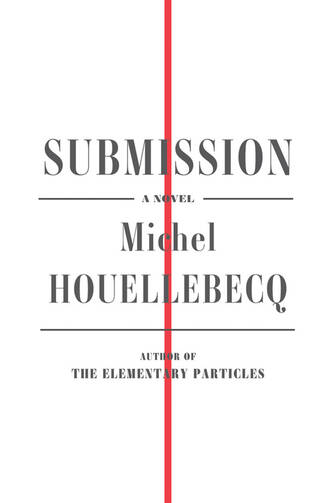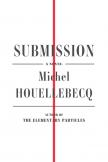Continental Conversion
This novel, published on the day of the Jan. 7, 2015, attack in Paris on the satirical magazine Charlie Hebdo, has continued as a best-seller at the center of critical wars for over a year. Its author, a French novelist, filmmaker, poet and biographer, has published several novels, the most famous of which, The Map and the Territory (2010), won the Goncourt Prize in France for its satiric portrait of the art world. His writings have provoked laughter and criticism, most often for their vulgarity, caricatures of women and races, and, in this most recent novel under review, of Europeans and Islam.
Reviewers questioned not only his pessimistic narrators, stereotypical characters and exaggerated plots but also the political correctness of his themes. Submission was even denounced by the French prime minister for being unpatriotic. Reviewers asked, Is this novel a satire on religion or secularism? Is the narrator, Francois, a nihilistic caricature of contemporary French academics or all European males? What is the attitude of the novel toward religion, especially Islam and Catholicism? What is the role of the narrator’s favorite author, J. J. Huysmans, and his decadent 19th-century background or his religious conversion? Some readers found the novel offensive, but many admitted it was thought-provoking. Some have compared its tone to that of a Jonathan Franzen novel for its misogynism and pessimism.
The novel begins by exposing the biases of the narrator, a French professor of 19th-century literature at the Sorbonne, who feels no vocation as a teacher, dislikes students (except as female sex objects), has few friends at the university and is estranged from politics and religion. Only in 2017, after his graduate-student mistress departs for Israel during a sudden upheaval in French politics, does the narrator become fascinated by the coalition between the Socialists, Muslims and later some conservatives to defeat the National Front nativists. Five years later, in 2022, the coalition elects Mohammed Ben Abbes, a popular Muslim leader, as prime minister. The government soon takes over education, transforms the Sorbonne into an Islamic university and forces teachers like the narrator to retire unless they become Muslims. Women are gradually pressured out of jobs and return to family life and more modest public attire.
During this upheaval, the narrator escapes Paris to the southwest, where he visits Martel and the shrine of the Black Virgin at Rocamadour, admiring its young pilgrims but finding its traditions to be only a “vanished universe.” Although he feels “a desperate desire to be part of a religion,” he returns to Paris “deserted by the Spirit.” There, he laments the death of his parents and the loss of his mistress, eventually feeling “close to suicide.” He makes one brief effort to follow his literary hero, Huysmans, by making a retreat at a Benedictine monastery but finds its Catholicism too weak and otherworldly, and the smoke-free retreat proves to be “a mistake from the beginning.”
His second return to Paris, which is prospering peacefully from Arab oil and North African efforts to join the European Union, draws the narrator back to academic life. With help from a publisher who wants him to edit a new edition of Huysmans, he is drawn by a former professor, who has become a Muslim and an administrator at the Sorbonne, to consider returning to university life and possibly converting to Islam. Like the administrator, the narrator is attracted by this offer, partly because of his religious search but primarily because of the high salary and polygamous family life. The novel ends with the narrator accepting the job and foreseeing a “submission” to “a second life.”
Like the narrators in many satirical novels by Jonathan Swift, George Orwell, Evelyn Waugh and others, François is a conflicted and unlikeable narrator, with several contradictory traits, including misogynism, cynicism and secularism mixed with pursuit of women, conservative idealism and bursts of religiosity. The only consistent values he displays are his dedication to literature and to a religious quest. He seems to model his life on Huysmans but never achieves his literary hero’s artistic achievements or later spiritual sincerity. The main question for readers remains unsettled: How much of the author Houellebecq can we find in the narrator François? According to a long interview in The Paris Review that appeared at the time of the publication of the novel, Houellebecq sharply distinguishes himself from his narrator, as he had from narrators of his previous novels. He asserts that he began this novel as a response to the deaths of family and friends, a response that first took the form of an agnostic’s search for religion in Catholicism similar to that of Huysmans’s.
When this earlier novel did not work out, he revised it radically, including some satiric dimension with regard to politics and journalists, but affirming a serious spiritual journey of a greatly flawed narrator. As Houellebecq said in the interview, “I think there is a real need for God and that the return of religion is not a slogan but a reality, and that it is very much on the rise.... I don’t believe that society can survive without religion.” When asked about the improbability of a large conversion to Islam in France, the author admitted that the novel was not meant to be realistic, but part of its sensational side as a social critique includes “scare tactics.” What he is critiquing, however, is not religion or immigration but what he calls “the philosophy handed down by the Enlightenment, which no longer makes sense to anyone, or to very few people.” Thus, as a critique of contemporary secularism and decadence, the novel affirms the worldwide return of religion, whether in the Islamic world or the Western world of Catholicism under Pope Francis (the latter, according to Houellebecq, “is doing rather well”).
The main themes of the novel have been clarified by later reviewers of the English translation, including one by the Scandinavian novelist Karl Ove Knausgaard (The New York Times Book Review, 11/8/15). He calls the plot unlikely but possible, and its thematic target “an entire culture’s enormous loss of meaning, its lack of, or highly depleted, faith, a culture in which the ties of community are dissolving.” For this reviewer, the satire is aimed at “the intellectual classes, among whom no trace is found of idealism, and not a shadow of will to defend any set of values, only pragmatism pure and simple.” The basic question the novel raises, as the author and late reviewer seem to agree, is: “What does it mean to be a human being without faith?” The novel’s narrator is on a search “directed beyond the human to the divine, the truly sacred.”
A further dimension of the novel that few of the reviewers have mentioned is the quasi-political values that the Islamic government tries to put into place in the last section of the novel. These two values are distributism and subsidiarity, the latter of which has been at the heart of Catholic social teaching since the 1930s. G. K. Chesterton was one of the proponents of distributism, as what the novel calls “a third way” between capitalism and socialism, a way that combined capital and labor by promoting worker-owned small businesses. Subsidiarity also became part of social change in the novel by means of the Muslim prime minister’s promotion of local and regional government and economy, similar to that proposed by the papal encyclical letter “Quadragesimo Anno” in 1930.
The lack of realism in the details of the politics and reforms described in the novel should not distract readers from seeing in the novel what one critic calls “a dystopian conversion tale.” It portrays an unlikely scenario of a Muslim political takeover in France but is a much more plausible critique of Western secularism and hedonism. However, the recent surge of immigration from Syria and North Africa into Europe since the appearance of this novel only make more complex the political future of the European Union. Although France is predicted to become 10 percent Muslim by 2030, some cities in Europe are already 20 to 25 percent immigrants from the Middle East, including Amsterdam, Birmingham and Marseilles. Although the media focus primarily on the social conflicts in Europe that have resulted this past year in terrorism and violence, little mention has been made of the spiritual influence of the cultural changes caused by religious movements on the continent. Interreligious conflict can also be the opportunity for interreligious dialogue and harmony. More significant for readers is the main point of Submission, the need for a retrieval of religious and spiritual values in Western society.
This article also appeared in print, under the headline “Continental Conversion,” in the April 4-11, 2016, issue.









